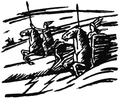Alruna (Old Norse Ǫlrún, Old High German Ailrun, Modern German Alruna, Alraune) is a Germanic female personal name, from Proto Germanic *aliruna (or possibly *agilruna), which is formed from runa "secret, rune" and a debated prefix that may be ali-, agil-, or alu-.
In German, Alruna was also used as a short form of Adelruna, a different name with a first element *athal- "noble".
In Germanic mythology, Ailrun is the wife of Agilaz, the legendary archer. In the poem Völundarkviða, Ölrun (possibly Old Norse "ale rune"[1]) is identified as a valkyrie, and as a daughter of Kiár of Valland.
Alruna of Cham was an 11th-century Bavarian recluse, the Roman Catholic patroness of pregnancy. It is also the name for the Mandragora or mandrake, a plant belonging to the nightshade family, in a number of Germanic languages: alruna in Swedish, alrune in Danish and Norwegian, and Alraune in German.
See also
[edit]Notes
[edit]- ^ Simek (2007:251).
References
[edit]- Simek, Rudolf (2007) translated by Angela Hall. Dictionary of Northern Mythology. D.S. Brewer. ISBN 0-85991-513-1

Well, that’s interesting to know that Psilotum nudum are known as whisk ferns. Psilotum nudum is the commoner species of the two. While the P. flaccidum is a rare species and is found in the tropical islands. Both the species are usually epiphytic in habit and grow upon tree ferns. These species may also be terrestrial and grow in humus or in the crevices of the rocks.
View the detailed Guide of Psilotum nudum: Detailed Study Of Psilotum Nudum (Whisk Fern), Classification, Anatomy, Reproduction